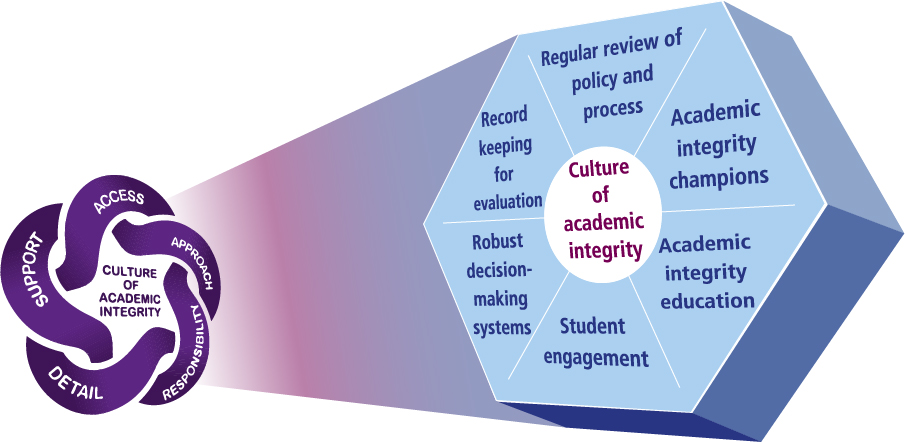Topic outline
-
Figure 1: Framework for enacting exemplary academic integrity policy (Bretag & Mahmud 2013, under review)
The five core elements of exemplary academic integrity policy identified by Bretag et al (2011)[1] were Access, Approach, Responsibility, Detail and Support, with no element given priority over another. According to Bretag et al, the purpose of the policy should be to develop shared values with all stakeholders based on a genuine and coherent commitment to academic integrity. In the United Kingdom, the Higher Education Academy developed 12 recommendations for good practice in relation to academic integrity policy, which resonate strongly with the five core elements detailed below:
- Access: The policy is easy to locate, easy to read, well written, clear and concise. The policy uses comprehensible language, logical headings, provides links to relevant resources and the entire policy is downloadable as in an easy to print and read document.
- Approach: Academic integrity is viewed as an educative process and appears in the introductory material to provide a context for the policy. There is a clear statement of purpose and values with a genuine and coherent institutional commitment to academic integrity through all aspects of the policy.
- Responsibility: The policy has a clear outline of responsibilities for all relevant stakeholders, including university management, academic and professional staff, and students.
- Support: Systems are in place to enable implementation of the academic integrity policy including procedures, resources, modules, training, seminars, and professional development activities to facilitate staff and student awareness and understanding of policy.
- Detail: Processes are detailed with a clear list of objective outcomes, and the contextual factors relevant to academic integrity breach decisions are outlined. The policy provides a detailed description of a range of academic integrity breaches and explains those breaches using easy to understand classifications or levels of severity. Extensive but not excessive detail is provided in relation to reporting, recording, confidentiality and the appeals process.
Following the Roundtable, key recommendations for enacting exemplary academic integrity policy were identified by the project team for immediate dissemination via the National Speaking Tour. These recommendations were further refined by Tracey Bretag and Saadia Mahmud, based on analysis of Roundtable presentation transcripts and are currently being fully explored in a paper for review. The six recommendations include:
- Regular review of academic integrity policy and process: Exemplary policy is not enough. Policy requires constant revision based on an institutional commitment to academic integrity and feedback from breach data, academic integrity breach decision-makers, appeals committees, senior managers, teaching staff, students and policy-makers in other functional areas
- Academic integrity champions: Data from all five institutions’ presentations were coded under this theme. ‘Academic integrity champions’ were from: outside the academy, management, staff and students.
- Academic integrity education for all stakeholders: Data from all five institutions were coded under the theme ‘educative approach’, corresponding with the project team’s preliminary analysis that indicated the importance of academic integrity education, and with the AISP recommendation for support.
- Student engagement: Presenters recognised the importance of encouraging students to be partners, rather than passive recipients in academic integrity education, and data from all five institutions were coded under ‘student engagement’.
- Robust decision making systems: All five universities recommended that there should a person or persons with a ‘designated academic integrity role’. Four out of five universities said they should be located within the faculty
- Record keeping for evaluation: All five institutions emphasised the need for centralised records. Academic integrity breach data should be confidentially maintained, managed and analysed for the purpose of process improvement, quality assurance, procedural fairness, transparency and improvement of teaching and learning
Tracey Bretag presented this preliminary work at the Plagiarism Across Europe and Beyond Conference, in Brno, Czech Republic on 12 June 2013. The keynote presentation can be found here.
Tracey Bretag presenting at Brno
[1] Bretag, T., Mahmud ,S., Wallace M., Walker R., Green M., East J., James C., McGowan U., and Partridge L. (2011). Core elements of exemplary academic integrity policy in Australian higher education. International Journal for Educational Integrity, 7(2): 3–12.
[2] Bretag, T & Mahmud, S. (2013, under review). Enacting exemplary academic integrity policy: An evidence-based framework. Submitted for review on 25 November 2013 to Studies in Higher Education.

